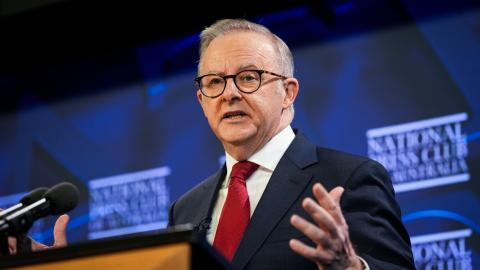In any negotiation, timing is important. On this front, Albanese is fortunate. China has just played its big trump card (no pun intended) by flagging restrictions on exports of rare earth elements and products ahead of a possible meeting between Trump and Xi Jinping.
Trump doesn’t like losing leverage. Following Beijing’s threat, Treasury Secretary Scott Bessent urged allies such as Australia to unite behind the US if China continues to weaponise its dominance of global supply chains. Enter the ever-lucky Albanese armed with a critical minerals solution for the US.
Except it won’t be that simple. Trump will like the Australian idea, but it is not big enough and won’t happen soon enough for the president to ignore the other things that Albanese would prefer not to discuss such as Australian defence spending.
In referring to the Chinese threat as its big trump card, it is really that. The moves announced by Beijing forces local companies to seek Chinese government approval to export products that contain at least 0.1 per cent or more of a rare earth such as holmium, erbium, thulium, europium and ytterbium.
Most will not have heard of these elements, but they are essential for producing and testing semiconductor chips. All semiconductors 14 nanometres or smaller need these elements and virtually all are processed in China. Additionally, Beijing is establishing a licensing regime that goes beyond semiconductors. Any China-based exporter selling a product with at least 0.1 per cent of the expanded list of rare earth elements will need an approved licence. Beijing is clear that it will not approve export licences for materials used in military applications.
Given the deliberately wide-ranging and opaque way the Chinese exporting licensing regime is constructed, one can be sure that restrictions will not only apply to products that go into the production of American military weapons. The export licensing regime will be selectively weaponised against other American firms and sectors for leverage during future negotiations or for coercive purposes. Chinese secondary sanctions can be imposed on foreign companies and even countries that help other foreign entities circumvent any of Beijing’s restrictions. In other words, the flagged Chinese measures involve the explicit weaponisation of the entire rare earths supply chain. As we know, that led to Trump threatening an additional 100 per cent tariff in response.
How did China get into this position of strength? The country dominates extraction, but more importantly, the processing of rare earths into useful forms such as magnets used in electric vehicles, because it can be done more cheaply there than anywhere else. Many of these rare earth products are produced and sold below cost because of generous subsidies, lax environmental impositions, export and tax credits, and other forms of government assistance. Beijing’s intent was always to eliminate competitors in other countries.
For Chinese and foreign firms needing products with rare earths in them, they price in artificially cheap Chinese-based supply into their cost structure. Over time, they become ever more dependent on Chinese suppliers. Even if they were able to source non-Chinese alternatives, their baked-in cost structure would reject such alternatives.
Enter Albanese. My understanding is that he is planning on a $1.2 billion scheme which sets up future production agreements for rare earths, lithium, and other critical minerals rather than a physical stockpile. This really means contracts to guarantee future supply for entities and countries within the agreement, with an emphasis on guaranteed supply for sectors such as defence, advanced manufacturing, and clean energy. The scheme could be jointly owned by countries such as the US, Japan, South Korea and the United Kingdom.
It will provide capital for developing projects during the early phases where costs are high, underwrite pricing floors so that commercial miners are less affected by the price manipulation techniques of Chinese suppliers, and reduce pricing and cash-flow risks for commercial partners in smaller or less liquid markets such as in heavy rare earths. Put simply, miners will have guaranteed buyers at a floor price and approved buyers will have guaranteed future supply.
It’s a good plan. However, it is not due to be launched until sometime in the second half of 2026. Trump is impatient at the best of times and even more so now, given the acute and imminent economic pain China is threatening. The government will find it difficult to agree on a floor price with miners and commercial partners of the scheme, especially for heavy rare earths, which suffer from an illiquid market. Either it will cost much more to subsidise an agreed floor price than the government would like, or the scheme won’t be as useful a buffer against Chinese supply chain coercion as intended. And Beijing will manipulate price benchmarks to make it even more expensive for the scheme to operate.
It will also be difficult for government and commercial entities in stakeholder countries to agree on details such as volumes, floor prices for different elements, and allocation given different needs and timelines. For the scheme to become a significant buffer against Chinese coercion, it will need to grow substantially. This means much more than $1.2 billion from the government to underwrite and reduce risk for commercial partners.
It’s a good idea and a promising scheme. But it might not be big enough or happening fast enough to bypass or eliminate the disagreements Albanese has with Trump on tariffs and defence.


















